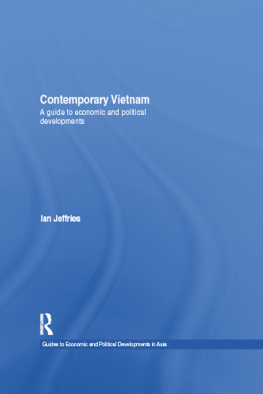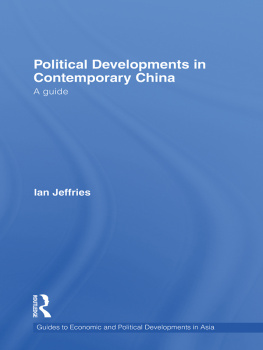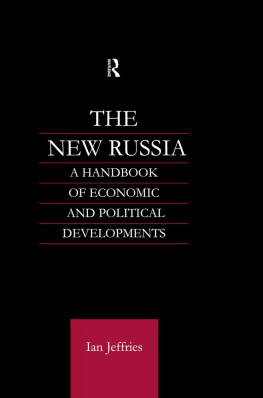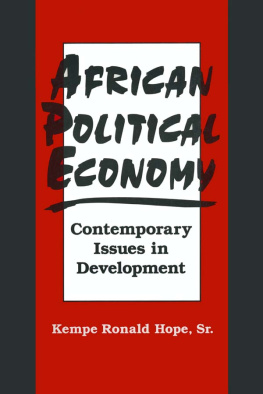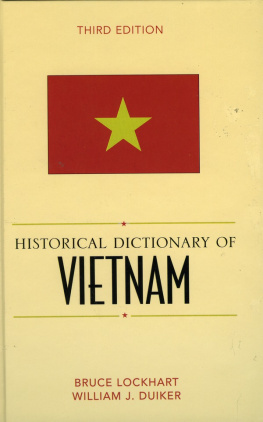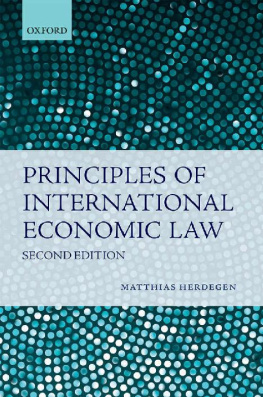Contemporary Vietnam
Praise for Ian Jeffries previous publications:
Socialist Economies and the Transition to the Market:
This weighty tome can be unreservedly commended... Students and their teachers can learn a great deal from this book... Excellent! Ian Jeffries has done us all a service.
(Alec Nove, Europe-Asia Studies)
The Countries of the Former Yugoslavia at the Turn of the Twenty-first Century: A Guide to the Economies in Transition:
This massive volume... should find a place in every university library.
(Sabrina P. Ramet, Europe-Asia Studies)
North Korea: A Guide to Economic and Political Developments:
Although it does not attempt to provide answers as to why events occurred as they did, it will be an indispensable source for any effort to do so.
(Christopher Griffin, Pacific Affairs)
China: A Guide to Economic and Political Developments:
This book is highly useful not only to casual China watchers... but also to researchers and academics.
(Marc Lanteigne, International Affairs)
This book provides full details of contemporary economic and political developments in Vietnam. It continues the overview of developments up to late 2005 which were covered in the author's Vietnam: A Guide to Economic and Political Developments (also published by Routledge, 2006). Key topics covered include Vietnam's success, in general, in maintaining high rates of growth in the face of problems such as inflation and the global financial crisis; continuing economic reforms; foreign trade and investment; battles against corruption; population growth; the determination of the Communist Party to maintain its hold on power; and Vietnam's response to public health problems such as AIDS, SARS and bird flu.
Ian Jeffries is Honorary Professor in the Department of Economics at Swansea University, UK. His recent publications include two volumes covering the economic and political developments in contemporary China (2010), alongside many books in the Routledge series Guides to Economic and Political Developments in Asia, covering China, North Korea and Mongolia.
Guides to economic and political developments in Asia
1 North Korea
A guide to economic and political developments
Ian Jeffries
2 Vietnam
A guide to economic and political developments
Ian Jeffries
3 China
A guide to economic and political developments
Ian Jeffries
4 Mongolia
A guide to economic and political developments
Ian Jeffries
5 Contemporary North Korea
A guide to economic and political developments
Ian Jeffries
6 Political Developments in Contemporary China
A guide
Ian Jeffries
7 Economic Developments in Contemporary China
A guide
Ian Jeffries
8 Political Developments in Contemporary Russia
Ian Jeffries
9 Economic Developments in Contemporary Russia
Ian Jeffries
10 Contemporary Vietnam
A guide to economic and political developments
Ian Jeffries
Contemporary Vietnam
A guide to economic and political developments
Ian Jeffries
First published 2011
by Routledge
2 Park Square, Milton Park, Abingdon, Oxon OX14 4RN
Simultaneously published in the USA and Canada
by Routledge
270 Madison Avenue, New York, NY 10016
Routledge is an imprint of the Taylor & Francis Group, an informa business
2011 Ian Jeffries
Typeset in Times by Wearset Ltd, Boldon, Tyne and Wear
Printed and bound in Great Britain by TJI Digital, Padstow, Cornwall
All rights reserved. No part of this book may be reprinted or reproduced or utilized in any form or by any electronic, mechanical, or other means, now known or hereafter invented, including photocopying and recording, or in any information storage or retrieval system, without permission in writing from the publishers.
British Library Cataloguing in Publication Data
A catalogue record for this book is available from the British Library
Library of Congress Cataloging in Publication Data
Jeffries, Ian.
Contemporary Vietnam : a guide to economic and political developments /
Ian Jeffries.
p. cm. (Guides to economic and political developments in Asia)
Includes bibliographical references and index.
1. VietnamPolitics and government. 2. VietnamEconomic conditions.
3. VietnamForeign economic relations. 4. VietnamEconomic policy.
I. Title.
DS559.912.J44 2010
959.704'4dc22 2010027435
ISBN: 978-0-415-60400-0 (hbk)
ISBN: 978-0-203-83437-4 (ebk)
Contents
Acknowledgements
I am much indebted to the following individuals (in alphabetical order):
At Swansea University: Robert Bideleux; Sin Brown; Diane Darrell; Michele Davies; Chris Hunt; Nigel O'Leary; Mary Perman; Ann Preece; Paul Reynolds; Kathy Sivertsen and Chris West.
Professors: Nick Baigent, John Baylis; George Blazyca, Steve Brown, Mike Charlton, Steve Cook, Phillip Hanson, Paul Hare, Lester Hunt, Michael Kaser, Phil Murphy and Noel Thompson.
Russell Davies (Kays Newsagency).
At Routledge: Louise Collins, Emma Davis, Alan Jarvis, Tracy Morgan, Jillian Morrison, Eve Setch and Peter Sowden.
Copy-editor: Liz Jones.
At Wearset: Matt Deacon, Claire Toal and Allie Waite.
While Mark Axelby expertly renovated my house, I was free to write my books.
Ian Jeffries
Honorary Professor
Department of Economics and Centre of Russian and
East European Studies,
Swansea University
Introduction and summary
This is a follow-up book to Vietnam: A Guide to Economic and Political Developments, published in 2006. The postscript dealt with events as late as March of that year. So this book deals with subsequent events and supplementary material not available previously.
At the end of the Second World War in 1945 Vietnam was a classically poor country (with, for example, a low national income per head and most of the labour force working in agriculture) and a generally poorly endowed one in terms of natural resources.
Ho Chi Minh's resilience in seeing off, in turn, such powerful opponents as France (the original colonial power), Japan and the United States is truly remarkable. Vietnam went on to give China a bloody nose in the border war of February 1979 over Kampuchea. Equally impressive is the nation's capacity to forgive and forget. On the other hand, nobody is blind to the deficiencies of such a one-party state in terms of human rights (including those of ethnic minorities) and in terms of problems such as corruption. Like China, Vietnam is determined to remain a one-party state, seeing economic reform and development as a means of helping the Communist Party retain that control in a stable country.
The Vietnam War ended in 1975 and the reunited country faced the problem of how a poorer, planned economy in which state ownership and control dominated could successfully absorb a more advanced, capitalist economy. The two Vietnams were reunited in 1975 and the two Germanys in 1990 (with the West German economy effectively absorbing its poorer communist neighbour). But the two Koreas remain divided, with South Korea in a different economic universe compared with its (now nuclear-armed) twin.

